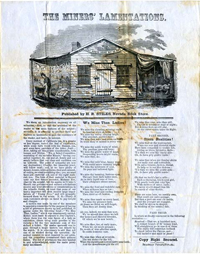“N. A. Chandler California Gold Rush Era Letters” is a great digital project available from Claremont College. Newton Chandler (1818?-1880), who arrived in San Francisco in 1855, wrote over fifty letters to his wife between 1855 and 1872. These letters provide interesting insights into the Gold Rush, including Chandler’s journey to California in 1855. While he “had a first rate passage…[and] enjoyed it well,” Chandler explained that conditions for “deck passengers was very bad.”
29
Jan
10
Newton Chandler California Gold Rush Era Letters
Posted by sailerd Published in 19th Century (1840-1880), Letters & Diaries Themes: Settlers & Immigrants27
Jan
10
Historic Iowa Children's Diaries
Posted by sailerd Published in 19th Century (1840-1880), Images, Letters & Diaries Themes: Settlers & Immigrants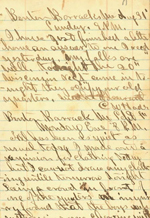 The University of Iowa has a small but interesting digital collection of diaries from children who lived in Iowa from 1860 to the 1900s. Of the eleven diaries that are available, three were written between 1860 and 1870. Even though they are relatively short (only a few pages have been digitized in some cases), the diaries can still provide interesting insights into the children’s experiences. One entry suggests that at least some children were paying attention to the important political issues of their day – Ellery Hancock, who was only about ten years old in 1860, noted on November 6 that Abraham Lincoln had been “elected.” One can learn more about the author through the short biographical sketch on the “document description” page in each diary.
The University of Iowa has a small but interesting digital collection of diaries from children who lived in Iowa from 1860 to the 1900s. Of the eleven diaries that are available, three were written between 1860 and 1870. Even though they are relatively short (only a few pages have been digitized in some cases), the diaries can still provide interesting insights into the children’s experiences. One entry suggests that at least some children were paying attention to the important political issues of their day – Ellery Hancock, who was only about ten years old in 1860, noted on November 6 that Abraham Lincoln had been “elected.” One can learn more about the author through the short biographical sketch on the “document description” page in each diary.
26
Jan
10
Teaching Civil War Era –To Judge or Not To Judge
Posted by Matthew Pinsker Published in Civil War (1861-1865), General Opinion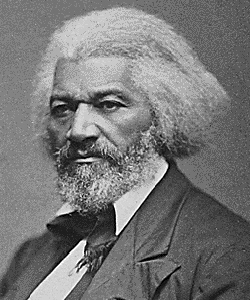 On Tuesday, January 26, 2010, I am beginning my Civil War Era history class with a quotation from Frederick Douglas at the top of my syllabus. “I shall never forget the difference,” the great activist claimed in 1894, “between those who fought for liberty and those who fought for slavery; between those who fought to save the Republic and those who fought to destroy it.” After surviving and escaping from slavery and after rising to become one of the nation’s great orators and moral visionaries, Douglass certainly earned the right to judge. But the question is … have I? Should a Civil War history professor lead off a syllabus and a semester with a comment like that one, which threatens to shatter the climate of historical objectivity and push students into making moral judgments about who was right or wrong during the Civil War era. Must they learn to condemn slavery and slaveholders, racism and racists –and most importantly, according to Douglass, treason and traitors– in order for the class to be a success? Or is it my job to encourage understanding about all sides in the conflict, regardless of how evil, cruel or stupid they might have been? I do believe in truth, but I also realize how dangerous it can be to turn historical study into an ersatz trial. My inclination is to accept an observation made several years ago by historian John Mack Faragher in the New York Times. “History is ultimately a moral art,” he told a reporter, “and it is about values. It is not merely about the collection of facts. It is about the way we put those facts together and the meaning we give them. Arguments about facts are arguments about meaning.” In other words, bring on the debate –as long as it comes rooted in evidence. But I wonder if students are really comfortable with that view or even know how to navigate historical texts and context while simultaneously arguing over values. Is it all too much, too soon? Has anyone had a classroom experience in any historical subject, but especially perhaps in the Civil War era, that might offer an answer, either as a model or as a warning?
On Tuesday, January 26, 2010, I am beginning my Civil War Era history class with a quotation from Frederick Douglas at the top of my syllabus. “I shall never forget the difference,” the great activist claimed in 1894, “between those who fought for liberty and those who fought for slavery; between those who fought to save the Republic and those who fought to destroy it.” After surviving and escaping from slavery and after rising to become one of the nation’s great orators and moral visionaries, Douglass certainly earned the right to judge. But the question is … have I? Should a Civil War history professor lead off a syllabus and a semester with a comment like that one, which threatens to shatter the climate of historical objectivity and push students into making moral judgments about who was right or wrong during the Civil War era. Must they learn to condemn slavery and slaveholders, racism and racists –and most importantly, according to Douglass, treason and traitors– in order for the class to be a success? Or is it my job to encourage understanding about all sides in the conflict, regardless of how evil, cruel or stupid they might have been? I do believe in truth, but I also realize how dangerous it can be to turn historical study into an ersatz trial. My inclination is to accept an observation made several years ago by historian John Mack Faragher in the New York Times. “History is ultimately a moral art,” he told a reporter, “and it is about values. It is not merely about the collection of facts. It is about the way we put those facts together and the meaning we give them. Arguments about facts are arguments about meaning.” In other words, bring on the debate –as long as it comes rooted in evidence. But I wonder if students are really comfortable with that view or even know how to navigate historical texts and context while simultaneously arguing over values. Is it all too much, too soon? Has anyone had a classroom experience in any historical subject, but especially perhaps in the Civil War era, that might offer an answer, either as a model or as a warning?
25
Jan
10
Emergence of Advertising in America
Posted by sailerd Published in 19th Century (1840-1880), Images, Letters & Diaries Themes: Education & Culture Duke University’s “The Emergence of Advertising in America: 1850 – 1920” is a great resource for learning more about the early advertising history in the United States. This collection, which has over 9,000 images, is organized into eleven categories – almost all of the advertisements produced before 1870 are in “Broadsides” and “Advertising Ephemera.” Yet there is still a wide variety of material from the Civil War era, as one can find broadsides for political parties (Democrat, Republican) to advertisements for hotels. If you want to find more broadsides from the Civil War, check out the Enoch Pratt Free Library’s collection, which I discussed in a previous post.
Duke University’s “The Emergence of Advertising in America: 1850 – 1920” is a great resource for learning more about the early advertising history in the United States. This collection, which has over 9,000 images, is organized into eleven categories – almost all of the advertisements produced before 1870 are in “Broadsides” and “Advertising Ephemera.” Yet there is still a wide variety of material from the Civil War era, as one can find broadsides for political parties (Democrat, Republican) to advertisements for hotels. If you want to find more broadsides from the Civil War, check out the Enoch Pratt Free Library’s collection, which I discussed in a previous post.
22
Jan
10
Sterling Family Papers
Posted by sailerd Published in Civil War (1861-1865), Letters & Diaries Themes: Battles & Soldiers, Women & Families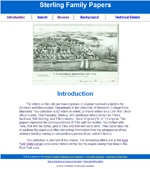 The University of Maryland has an interesting collection of sixty two letters from a family who lived in Maryland during the Civil War. This project consists primarily of Tillie Farquhar Sterling’s correspondence with her mother, which can provide an interesting look into daily life in Maryland between 1862 and 1864. Other letters in the collection include those written by Tillie’s husband, who was an officer in the US army. In addition, the site has a short essay that provides more information on the family’s history. The New York State Library also has a collection of letters from this family, although they have not been digitized yet.
The University of Maryland has an interesting collection of sixty two letters from a family who lived in Maryland during the Civil War. This project consists primarily of Tillie Farquhar Sterling’s correspondence with her mother, which can provide an interesting look into daily life in Maryland between 1862 and 1864. Other letters in the collection include those written by Tillie’s husband, who was an officer in the US army. In addition, the site has a short essay that provides more information on the family’s history. The New York State Library also has a collection of letters from this family, although they have not been digitized yet.
21
Jan
10
Post Office and the Press
Posted by sailerd Published in Antebellum (1840-1861), Historic Periodicals Themes: Slavery & Abolition The United States Post Office had an important role in suppressing antislavery material in slave states before the Civil War. Newspapers and books, such as the New York Tribune and Hinton Rowan Helper’s The Impending Crisis of the South (1857), were not always distributed in southern states.The Chicago Press and Tribune, which supported the Republican party, was one of many northern papers that published specific examples. One article from January 1860 is particularly interesting since it described an incident in Delaware, a slave state. The Millord News and Advertiser had complained that their local “Postmaster [had] refused to distribute” the paper. While “[it was] a journal of moderate free State sentiments,” the Chicago Tribune explained that that paper “in no respect…countenance any other than legal and constitutional measures for the gradual removal of slavery from its own State.” Yet apparently even that stance was enough for a ban. When “our boasted free government [was]… in the hands of” Democrats, the Tribune concluded that it was “not less a despotism than the most absolute government of Europe.”
The United States Post Office had an important role in suppressing antislavery material in slave states before the Civil War. Newspapers and books, such as the New York Tribune and Hinton Rowan Helper’s The Impending Crisis of the South (1857), were not always distributed in southern states.The Chicago Press and Tribune, which supported the Republican party, was one of many northern papers that published specific examples. One article from January 1860 is particularly interesting since it described an incident in Delaware, a slave state. The Millord News and Advertiser had complained that their local “Postmaster [had] refused to distribute” the paper. While “[it was] a journal of moderate free State sentiments,” the Chicago Tribune explained that that paper “in no respect…countenance any other than legal and constitutional measures for the gradual removal of slavery from its own State.” Yet apparently even that stance was enough for a ban. When “our boasted free government [was]… in the hands of” Democrats, the Tribune concluded that it was “not less a despotism than the most absolute government of Europe.”
18
Jan
10
The Oberlin-Wellington Rescue (1858)
Posted by sailerd Published in Antebellum (1840-1861), Historic Periodicals, Images, Letters & Diaries Themes: Slavery & Abolition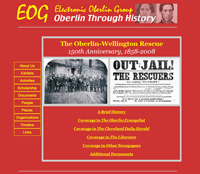
Oberlin College has a great digital exhibit on the Oberlin-Wellington Rescue that took place in September 1858. This event represented an important challenge to the Fugitive Slave Act of 1850, as residents were successful in their efforts to prevent southerners from returning fugitive slave to slavery. Some of the rescuers were arrested and their trial in 1859 attracted national attention. (Read a more detailed account of this event here). The site offers coverage of both the rescue and the trial from three newspapers – Oberlin Evangelist, Cleveland Daily Herald, and the Boston Liberator. A selection of newspaper articles from across the country are also available. Also check out other documents related to the trial, such as Charles Langston’s speech.
Oberlin College has a number of otherdigital exhibits, such as “Oberlin and Women’s Struggle for Equality” and Oberlin and “Struggle for Black Freedom.”
15
Jan
10
Papers of Jefferson Davis
Posted by sailerd Published in 19th Century (1840-1880), Images, Letters & Diaries Themes: Contests & ElectionsRice University has created a great online supplement for their 12 volume Papers of Jefferson Davis project. While not all of the papers have been posted online, the site offers a nice selection of material from his entire career. One can read “a listing of the demerits Davis received while” at West Point, a newspaper article that described his speech in May 1849 on the increase in sectional tensions, a speech in July 1860 in support of John Breckinridge’s campaign, a letter to his wife in April 1865, and many other interesting documents. The project plans to add even more material in the future. One should also check out the other resources on the site, including a detailed timeline of Davis’ life and pictures of him and other family members.
13
Jan
10
Webcast – "America on the Eve of the Civil War"
Posted by sailerd Published in Antebellum (1840-1861), Video Themes: Contests & Elections, Slavery & Abolition
“America on the Eve of the Civil War,” a conference held in April 2009 and sponsored by the Virginia Sesquicentennial of the American Civil War Commission, is now available online as a Webcast. Sixteen historians participated in this conference, which included four different sessions – “Taking Stock of the Nation in 1859”, “The Future of Virginia and the South”, “Making Sense of John Brown’s Raid”, and “Predictions for the Election of 1860.” (Each session can be viewed separately.) Interviews are also available – the historians answer a wide range of questions, such as “What do we need to better understand about this time period?” and “Are there still lessons for us today from 1859?” You need to have the Real Media player installed in order to watch these videos.
11
Jan
10
"WalMart and the Civil War"
Posted by sailerd Published in Civil War (1861-1865), General Opinion, Video Themes: Battles & Soldiers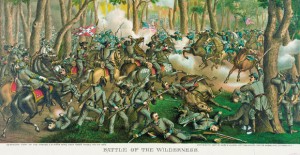
Ta-Nehisi Coates, a contributing editor at the Atlantic, has an interesting essay on “the war between [battlefield] preservation and commerce.” This essay focuses on the Battle of the Wilderness in Virginia and the controversy over Wal-Mart’s plan to build a store at a key location. In addition, check out the author’s video tour of this battlefield and an interview with historian Frank Smith on the significance of African American soldiers during the Civil War.
